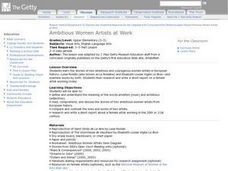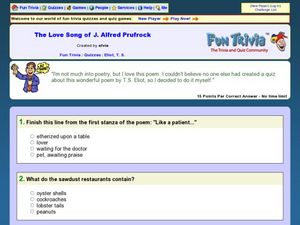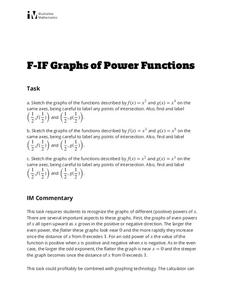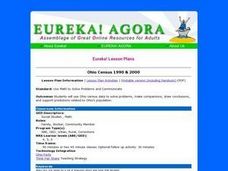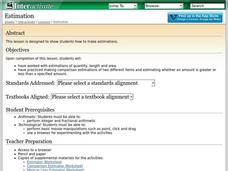EngageNY
Comparing Ratios Using Ratio Tables
Decide which concentration of mixtures is the strongest. Pupils use tables to compare ratios involved in mixtures. They use two methods to make the comparisons — by finding equivalent values within the tables or by comparing the values...
Noyce Foundation
Truffles
Knowing how to scale a recipe is an important skill. Young mathematicians determine the amount of ingredients they need to make a certain number of truffles when given a recipe. They determine a relationship between ingredients given a...
Curated OER
A Planting We Will Go
Even the youngest kids can make scientific comparisons using collected data. They read The Tiny Seed, then discuss the essential nutrients and elements needed for a seed to grow into a blooming plant. They plant seeds and track their...
NOAA
Wet Maps
How do oceanographers make maps under water? Junior explorers discover the technologies and processes involved in creating bathymetric maps in part three of a five-part series designed for fifth- and sixth-grade pupils. The lesson...
Yummy Math
Penny Wars
As the saying goes, a penny saved is a penny earned. Young scholars use a penny activity to earn their way to an understanding of volume. Given three different-sized cylindrical containers, individuals make calculations to determine the...
Penguin Books
A Teacher’s Guide to the Signet Classics Edition of Mary Shelley ’s Frankenstein
Contrary to popular belief, the monster's name in Mary Shelley's Frankenstein is not Frankenstein. A teacher's guide for the novel helps readers make sense of key details in the text, define vocabulary words, and discuss prominent...
J. Paul Getty Trust
Ambitious Women Artists at Work
Ambition is the keyword of a lesson that focuses on the contributions made by famous female artists. Specifically looking at European artists, Luisa Roldan and Elisabeth Louise Vigee Le Brun, scholars examine a piece of their work then...
Lerner Publishing
Meet the Dinosaurs
Take your class of youngsters on a prehistoric adventure with this four-lesson series on dinosaurs. Accompanying the Meet the Dinosaurs books by Don Lessem, these lessons engage children in writing their own dinosaur books, making...
Academy of American Poets
Teach This Poem: “Crisscross” by Arthur Sze
Arthur Sze's poem "Crisscross" launches a instructional activity that asks scholars to use their observation skills. They first draw an image that reflects what crisscross means to them. They then examine a photograph of a lightning...
Curated OER
Clash of Cultures: Comparing the 1920s and 1960s
Students identify the social, culturaland political problems of the 1920s and compare them to the problems of the 1960s. They research both eras and then make a presentation to the rest of the class.
Curated OER
Greater Than, Less Than, and Equal To
For this number comparisons worksheet, 1st graders use the number line to help them compare the numbers in each set. Students circle the words greater then, less than, or equal to for the 19 problems.
Curated OER
Nutrients for Plants and People: Reading Food Labels for Nutrition
Apply work with the food pyramid with this worksheet. Have your class go through their cupboards at home and find 5 different foods to inspect. On this handout, they record the food, what part of the food pyramid this food fits into, and...
Curated OER
The Love Song of J. Alfred Prufrock quiz
Delve into the mysterious lines of T.S. Eliot's The Love Song of J. Alfred Prufrock. Focusing on simple recall of the poem, this quiz can then spark discussion about the odd comparisons and allusions within the lines. A simple quiz that...
National Council of Teachers of Mathematics
The Roll Out Fractions Game: Comparing Fractions
Reinforce the concept of comparing fractions with a hands-on, two-player game that calls for a visual model, score board, and dice. Players roll dice to acquire their given fraction, create the fraction using fraction tiles, then compare...
Curated OER
Japan
Introduce your class to the beauty, population, architecture, and special places of Japan. They'll learn about the currency, the weather, and how Japan is different or similar to New Zealand. Note: While this presentation makes...
Curated OER
South Asian Architecture
Seventh graders review and discuss architecture from South Asia. They then study images of various buildings from North Africa/Southwest Asia, and make comparisons
Curated OER
Seasons Of Art
Students engage in a lesson that is about the study of seasons and the colors related to them. They use paints in order to create a window scene. Students engage in class discussion about the seasons of the year and make comparisons.
Illustrative Mathematics
Graphs of Power Functions
This activity consists of three exercises in which learners sketch the graphs of various power functions on the same axes. They use their sketches to make comparisons and observations which lead to generalizations about the graphs of...
Curated OER
Ohio Census 1990 & 2000
Students use Ohio census data to solve problems, make comparisons, draw conclusions, and support predictions related to Ohio's population. They interpret and work with pictures, numbers and symbolic information.
Curated OER
Population Pyramids
Students utilize population pyramids to answer questions, make comparisons, draw conclusions and support predictions about the populations of China, India and the Unites States. They arrange numbers and symbolic information from various...
Curated OER
Social Studies: Global Women and Poverty
Students conduct research and make comparisons about various global economies. Create graphic organizers to present their research findings and illustrate solutions to problems. Students discuss and debate issues based on what they have...
Curated OER
Bugs
Students participate in an after school program that promotes communications skills, hypothesizing, exploring, recording of data, leadership roles and making comparisons. They explore the world of insects, where they come from, how they...
Curated OER
Estimation
Students explore the concept of estimation. In this estimation activity, students discuss making estimates through teacher led discussion. Students use the Internet to complete an activity where they must estimate the length of lines.
Curated OER
Comparison of Adjectives
In this adjective comparison worksheet, students complete sentences by selecting the correct form of adjectives; one sentence is given to base choices on.








